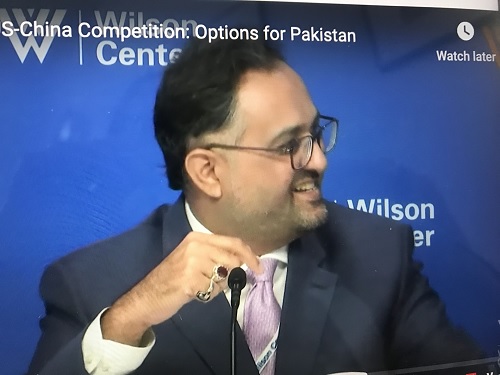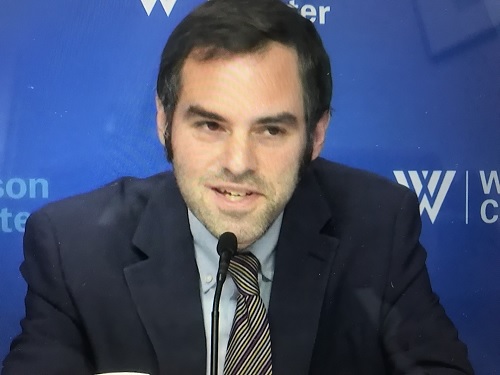Wilson Center Program Reviews Options for Pakistan amid US-China Competition
By Elaine Pasquini
Photos by Phil Pasquini

Washington: As the US-China rivalry intensifies, Wilson Center Pakistan Fellow Baqir Sajjad discussed options available for Pakistan on November 8, 2023, with the Center’s South Asia Institute director Michael Kugelman.

Baqir Sajjad
“Presently, we are seeing some interesting iterations of the US-Pakistan-China triangle playing out,” Kugelman said. “US-Pakistan relations are unsettled, uncertain, but they are currently in a calm period. There are no crises.” And, he added, the message he hears from the US Embassy in Islamabad these days is that trade and investment should really be a “priority for the relationship, although there are clearly challenges.”=
Sajjad pointed out that the US cannot ignore the profound geopolitical shifts that are taking place central to which is the China-United States rivalry. “We need to recognize that this is not just a news headline, it is impacting our daily lives…the way countries interact, and businesses operate and it has heavily influenced the pulse of the global economy.”

Michael Kugelman
The United States is watching Chinese influence rise, he said, especially concerning “who is going to be the next technology king and at the same time who is going to set the economic rules for the future.” Unlike during the Cold War, at this time the two parties are fairly matched; they are economically intertwined and have many shared global interests. “The challenge is to move forward and avoid missteps,” he added.
With regard to how political circles in Pakistan see this revolving US-China rivalry, “Pakistan understands the depth of US strategic anxiety, especially after the branding of China as a strategic competitor…and understands it is something that is going to impact its foreign policy objectives and game plan,” Sajjad said.
The US military and political support as well as economic incentives to countries along the east China Sea to check China’s maritime and territorial plans which Washington sees as aggressive and expansionist, and which is part of a broader US strategy to prevent China from dominating the region, has forced Pakistan to re-assess its foreign and defense policy and is a harbinger of the delicate tightrope Pakistan must walk, he said.
But Pakistan’s position as a nuclear power and its large population makes it a player that neither the United States nor China can ignore and the possibility of an economically devasted Pakistan is something that both Washington and Beijing are trying to avoid right now, he added.
Increasing communication with both the United States and China is of utmost importance, Sajjad stressed. “In diplomatic dialogue with the United States and China, Pakistan should emphasize its commitment to sovereignty and mutual benefits of cooperation. There should be continuous dialogue with both sides to prevent any misunderstandings.” In addition, he said, Pakistan would have to leverage opportunities and economic cooperation framed within the context of Pakistan’s national needs.
Pakistan should utilize and continue to benefit from China’s Belt and Road Initiative and the China-Pakistan Economic Corridor (CPEC) for its economic growth but at the same time it should keep exploring avenues for trade and investment with the West, Sajjad advised. “The defense and security partnership should also continue with Beijing which is a steadfast source of support for Pakistan. But at the same time, it should continue engagement with the United States on counterterrorism and regional stability. But the important thing is there should be transparency on the cooperation with both sides because neither side should feel that its interests are being compromised.”
With regard to balancing financial engagements, Pakistan has to manage financial arrangements with China to dispel this impression of falling into this Chinese debt trap and it should also manage its workings with the International Monetary Fund and World Bank so people do not get the impression it is pivoting away from China because that would come with costs as well, he said. “It must imply multiple alignments…and increase its engagement with the European Union. The underlying premise is to maintain sovereignty and agency in international relations without becoming a pawn in strategic games.”
Pakistan does not have a continuation of policies, although there is a framework for one that continues all along but still they have to shift according to the prevailing situation, he said, because “Pakistan is an economically fragile country and there is political instability so there cannot be a continuation of policies.”
The main plank of US-Pakistan cooperation continues to be counterterrorism even though counterterrorism has gone down on the agenda of the United States foreign policy priorities, Sajjad argued. And much of US foreign policy bandwidth is regional stability. “So, even though Pakistan has gone down on the priority list of the political c in Washington, Pakistan still retains a bright spot for the folks over at the Department of Defense.”
“As far as the relationship with the United States is concerned, the basic problem is that this relationship has been influenced by extraneous elements rather than being built on intrinsic value,” he said. “We came together because of the Cold War, then the Soviet invasion of Afghanistan, then the war on terror. There is nothing right now in Pakistan that interests the United States, and Pakistan is not an economic success story, so it is not very attractive for the American corporate sector.”
Americans want to hear what Pakistan can do right now and whether it has the potential to be good business partners over there, Sajjad added. “So, we have to develop that clarity.”
Ending on the subject of climate change, Kugelman noted that “It’s true that all three of the countries we have been discussing face this threat in a big way. Indeed, if you are looking for possible pathways for this triangle to be a conducive one, a positive one, I think climate change may be the angle to look at…in the current moment and also public health.”
(Elaine Pasquini is a freelance journalist. Her reports appear in the Washington Report on Middle East Affairs and Nuze.Ink.)

